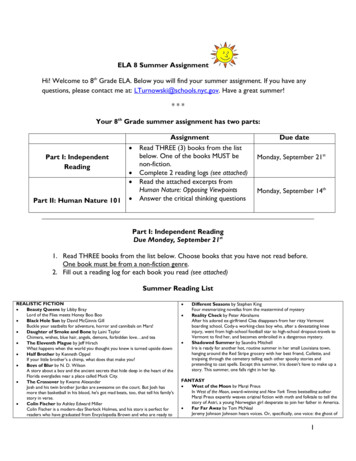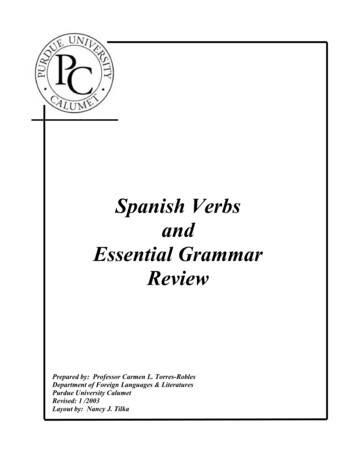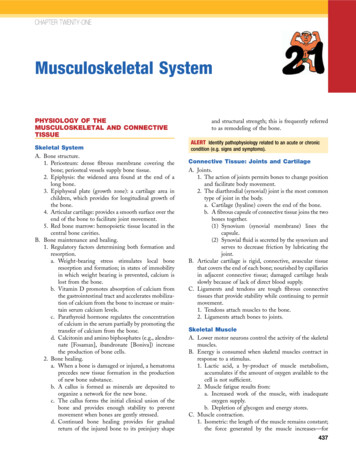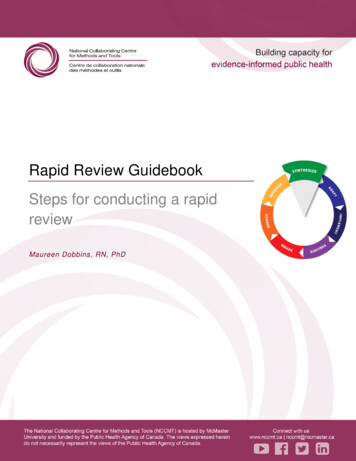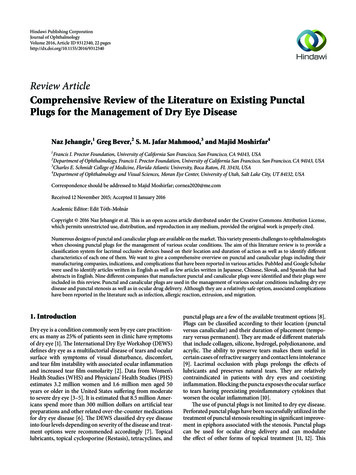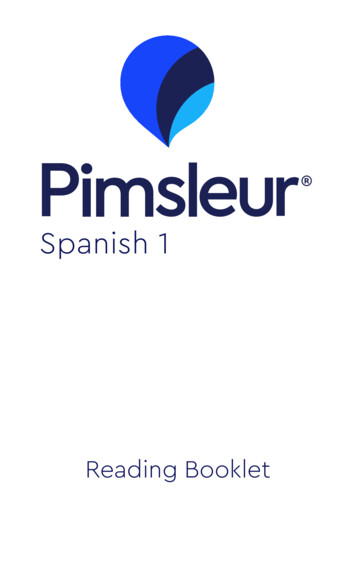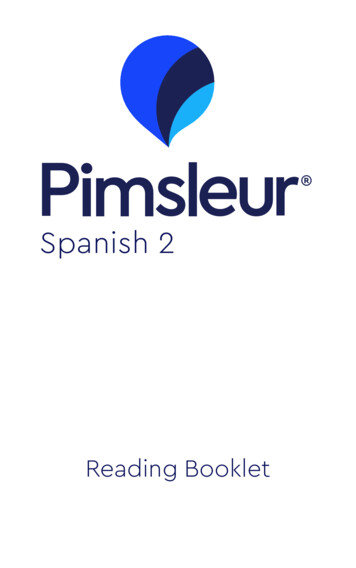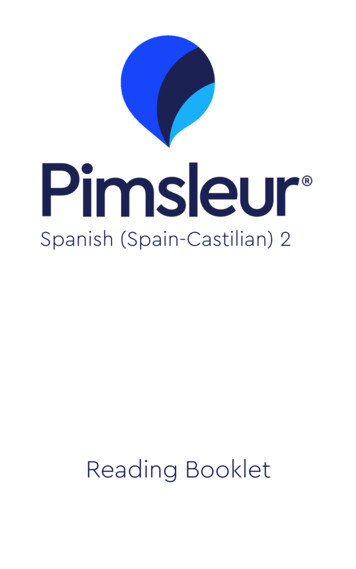
Transcription
Name:Spanish 1SummerReview# of Activities I completed:Student Signature:I verify that I have completed at least 10minutes of Internet Activities for eachassignment I am turning in as Complete.Parent Signature:I verify that the assignments I havesigned for were completed thissummer by my son/daughter.
Top 10 Reasonsto Complete this Review10Spanish, Spanish everywhere!10.There are 35 million Spanish speakers in the U.S. alone: many friends and maybe familymembers speak Spanish.9. And Pop culture is strongly influenced by Hispanic heritage: Yo quiero Taco Bell!8.9Win-Win!Ifa win-win by helping English speakers with Spanish7.you like to help others, experienceand Spanish speakers with English.6.8Good Medicine!5.Knowing2 languages reduces the chances of you developing dementia (and Alzheimer’s).4.7Get Smarter!Studying3. another language increases your critical thinking skills and improves your memoryall while giving you a better understanding of English.2.6Travel becomes an Adventure!1.You will receive a Test score for all your hard work!You’re not limited to watching life from a tourist resort—you can dive right in and get toknow the people and their culture.5Understanding!You’ll finally be able to understand Dora the Explorer and all the waiters at Plaza Azteca.4It’s Easy!Spanish is nearly phonetically perfect so you can look at any word and immediately knowhow to pronounce it.3It’s Fun!TV, movies, music, food, shopping, video games all are beginning to reflect an influencefrom Hispanic culture.2The Ultimate Food Experience!You’ll be able to order a Krispy Kreme dessert burrito with chipotle filling.1100% on a Test Grade!How much you do determines how high your Test score is—go for the Gold!
What to Do This Spanish 1 Review Booklet is available on-lineat: http://summerspanish.weebly.com The Review booklet is designed to be used with theInternet, so you will need Internet access. Look through the Booklet to understand how it isarranged and how to use it. Use the Calendar to map out your Review sessionsalong with all your summer activities and vacations.It’s great to use drive time to do activities, butremember you’ll have to schedule in Internet timethroughout the Summer. Your folks will need to sign off on the ActivityPages to verify you spent time interacting with thematerials on the Internet. The first day of school (August 24) you will turn inyour Spanish 1 Review Booklet with Signature pagecomplete and you will write a composition that willserve as part of your Spanish 2 Pre-Assessment. Have FUN with your Spanish this summer becausethe Internet Activities in this Review are all games!Scale for Test Scoring:39 Activities for 10 minutes each 100% A 32 Activities for 10 minutes each 90% B 24 Activities for 10 minutes each 80% C16 Activities for 10 minutes each 70% D8 Activities for 10 minutes each 60% F7 or less Activities 0%
How to Use this BookletThis booklet is designed to be used with the Internet.Each Topic covered in Level 1 study has its own set ofpages—you can complete the Topics in any order.Below the Topic listed on each page you’ll find links to ahelpful Explanation of the topic. You may also consult theGrammar and Animated Grammar tabs at thewww.classzone.com site—just look under: Animations andclick on Animated Grammar. There you can watch theanimated grammar clip &/or click on the Gramática tab fora written explanation.Below the Explanation section is a brief Summary to helpyou recall the Topic.The Práctica section of the page gives you a brief practice.The answers to these activities are found in the back of thisBooklet on a Respuestas (answers) page.On-line practice sites are listed in the shaded boxes.These links will take you to a variety of activities that are allself-scoring for instant feedback. Do some or all of themuntil you understand and can do the topic well. (If a link isfaulty, just choose another—there are plenty to choosefrom.)There is also a Vocabulary section in this booklet.Vocabulary practice links are arranged by Unit / Lessoncorresponding to the Avancemos 1 text. You can alsopractice Vocabulary at the www.classzone.com site—justlook under: Online Review and click on Flashcards and/orGames. Vocabulary for each Lesson counts as a Topic.
CALENDARUse this Calendar to plan your Spanish review:July1 WeJune6 Sa7 SuAugust2 Th3 Fr1 Sa4 Sa Independence2 Su8 MoDay9 Tu5 Su10 We6 Mo11 Th7 Tu12 Fr8 We13 Sa9 Th14 Su10 Fr15 Mo11 Sa16 Tu12 Su17 We13 Mo18 Th14 Tu19 Fr15 We20 Sa16 Th21 Su17 Fr22 Mo18 Sa23 Tu19 Su24 We20 Mo25 Th21 Tu26 Fr22 We27 Sa23 Th28 Su24 Fr29 Mo25 Sa30 Tu26 Su27 Mo28 Tu29 We30 Th31 Fr3 Mo4 Tu5 We6 Th7 Fr8 Sa9 Su10 Mo11 Tu12 We13 Th14 Fr15 Sa16 Su17 Mo18 Tu19 We20 Th21 Fr22 Sa23 Su24 Mo REVIEWDUE for ALLstudents (even ifyou are takingSpanish 2 secondTerm)
TABLE OF djectives4.Demonstrative Adjectives5.Possessive Adjectives6.Subject Pronouns7.Object Pronouns8.Prepositional Pronouns9.Present Tense Verbs10. Stem Change Verbs11. Irregular Verbs12. Gustar13. Hay14. Reflexives15. Present Progressive16. Verb Combinations17. Saber vs Conocer18. Ser vs Estar19. Expressions with Tener & Hacer20. Preterit Tense Regular Verbs21. Preterit Irregulars: -car, -gar, -zar22. Preterit Irregulars; ir, ser, hacer23. Tú Affirmative CommandsVocabulario24. All the Avancemos 1 Practice SitesRespuestasPages 25 - 32
1PronunciationAvancemos: Lección PreliminarClick on these links to read/print and Explanation of this topic:Dr. Lemon: http://www.drlemon.net/Grammar/alphabet.html ácticaThe best thing to do to practice Pronunciation is to Listen and then Repeat, trying toimitate the sounds you are hearing.Classzone.com has hundreds of Audio files you can listen to and Repeat. Go to os 1/bookhome.htm?state VATry and Listen / Repeat on a daily basis throughout the summer.There are many other sites on the Internet that give you the opportunity to refine yourPronunciation. I have listed a few in the grey box below. The Iowa site (last one) isparticularly interesting because it has an animated mouth that actually shows you—physically—how to pronounce words!Click on these links to practice this topic on the Web:http://www.colby.edu/ ck on any of the Topics in the left-hand /about.html#(click on Launch Spanish Library; in the pop up box, click ona tab in the top row and then the tab that appears below it: agroup of letters appear that you can click on and see as wellas hear how they are produced)
2QuestionsAvancemos: Unit 2 Lesson 2Click on these links to read/print and Explanation of this topic:Study Spanish: http://studyspanish.com/lessons/quest.htmDr. Lemon: Questions can be formed by:1) adding ¿no? Or ¿verdad? to the end of a statement2) changing the verb / subject order so that the Verb comes first in the sentence3) using a Question Word such as:¿Quién? Who?¿Dónde? Where?¿Con quién? With whom?¿A dónde? To where?¿Qué? What?¿De dónde? From where?¿Qué significa? What does it mean?¿Por qué? Why?¿Cuándo? When?¿Cómo? How?¿Cómo está? How is he/she feeling?¿Cómo es? (How) What is he/she like—describe them.¿Cuántos-Cuántas? How many?Remember that the subject of a question is usually at the end of the question.PrácticaMatch the Question with its logical answer:1. ¿Dónde está María?a) Está muy contenta.2. ¿De dónde es María?b) Es una estudiante.3. ¿Cómo es María?c) Es de Costa Rica.4. ¿Cómo está María?d) Está aprendiendo español.5. ¿Por qué está contenta María? e) Este fin de semana.6. ¿Quién es María?f)Está en clase de español.7. ¿Adónde va María?g) Es alta y simpática.8. ¿Cuándo va María al cine?h) Va al cine.Click on the links on the back of this page to practice this topic on the Web:
Questions continuedClick on these links to practice this topic on the ://studyspanish.com/lessons/games/quest-sp.htm (audio)http://www.colby.edu/ sewanee.edu/Language 9170.html
3AdjectivesAvancemos: Unit 2 Lesson 2Click on these links to read/print an Explanation of this topic:Dr. Lemon: ives must agree with the nouns they describe.They agree in number:el zapato negrolos zapatos negrosThey agree in gender:el almuerzo nutritivola cena nutritivamasculineel muchacho estudiosolos muchachos estudiososfemininela muchacha estudiosalas muchachas estudiosassingularpluralPrácticaWrite the correct form of the adjective that matches the family members listed:1. Mi tío es muy . (organizado)2. Mis abuelos son pero muy .(viejo / activo)3. Tengo un hermano que es muy .(desorganizado)4. Y tengo una hermana que es . (artístico)5. Mis padres son y .(inteligente / trabajador)6. Mis dos tías son muy diferentes: una tía es(serio) y la otra es . (cómico)Click on the links on the back of this page to practice this topic on the Web:
Adjectives continuedMás PrácticaChange the adjective in parentheses to agree with the noun it describes:1. los hombres (pelirrojo)5. una amiga (bueno)2. mis primas (menor)6. los jugadores (atlético)3. un invitado (cómico)7. el hijo (estudioso)4. la mujer (perezoso)8. la madrastra (bonito)Click on these links to practice Noun / Adjective Agreement on w.quia.com/jg/730399.html rand.html?layer act&src ace ch02 ://studyspanish.com/lessons/games/adj1-la.htm (audio)http://www.colby.edu/ bknelson/SLC/adjectives and nouns.phphttp://www.quia.com/jg/618433.html (match with English)http://www.quia.com/rr/316477.html (w/school subjects)http://www.quia.com/rr/108853.htmlClick on these links to practice Adjectives on the uia.com/rr/128468.html (ser vs estar)http://www.quia.com/jg/1313627.html ://www.quia.com/jg/524175.html (definitions)http://www.quia.com/jg/1510983.html (opposites w/pics)
DemonstrativeAdjectives4Avancemos: Unit 8 Lesson 2Click on these links to read/print an Explanation of this topic:Study Spanish: .htmDr. Lemon: emonstrative Adjectives must agree with the nouns they describe.They agree in number:este zapatoestos zapatosThey agree in gender:este almuerzoesta cenathis, theseeste peineestos peinesthat, thoseese peine esos peinesesta toallaestas toallasesa toallaesas toallasthat, those way over thereaquel peineaquellos peinesaquella toallaaquellos toallasPrácticaWrite the correct form of the Demonstrative Adjective for the English given:1. restaurante es delicioso. (this)2. cafés son viejos. (those over there)3. teatro es moderno. (that one way over there)4. entradas son para el concierto. (these)5. cine tiene buenas películas. (that)6. autobúses son amarillos. (those way over there)7. ventanilla solamente tiene dos personas. (that)Click on the links on the back of this page to practice this topic on the Web:
Demonstrative Adjectives continuedClick on these links to practice this topic on the /demonstratives-sp.htm (audio)http://www.quia.com/quiz/1334702.html (este/ese)http://www.quia.com/pop/117564.html (agreement)http://www.quia.com/jg/1326538.html 9499.html ( review of adjectives)
Possessive Adjectives5Avancemos: Unit 3 Lesson 2Click on these links to read/print an Explanation of this topic:Study Spanish: http://www.studyspanish.com/lessons/possadj.htmDr. Lemon: sessive Adjectives agree with the nouns they describe:My mi, mis mi libro, mis librosYour tu, tus tu sandwich, tus sandwichesHis, her, your (formal) su, sus su hermano, sus hermanosOur nuestro, nuestra, nuestros, nuestras nuestro tío, nuestros tíos,nuestras tías, nuestras tíasTheir, y’alls su, sus su casa, sus casasPrácticaReplace the English with the correct Spanish Possessive Adjective:.1. (Your) calcetines están sucios.2. (My) ensalada es muy nutritiva.3. El camarero nos trae (our) cuenta.4. A los jugadores les gustan (their) aficionados.5. Tú debes lavar (your) cortinas.6. Nosotros hacemos (our) quehaceres todos los sábados.7. Miguel está comprando (his) entradas para el cine.8. (Our) equipo favorito nunca pierde (their) partidos.Click on the links on the back of this page to practice this topic on the Web:
Possessive Adjectives continuedClick on these links to practice this topic on the 5.htmlhttp://www.quia.com/jg/1532321.html (and articles review)http://www.sewanee.edu/Language Lab/spanish/possde.html(Vocab needed: novia; amigas; apartamento; ames/possadj-la.htm
6Subject PronounsAvancemos: Unit 1 Lesson 1Click on these links to read/print and Explanation of this topic:Study Spanish: http://studyspanish.com/lessons/subpro.htmDr. Lemon: lUse Subject Pronouns to replace the subject of a sentence:I yo(familiar)You túHe élShe ella(formal)You usted (Ud.)We nosotros, nosotras(Spain)You vosotrosThey ellosThey (girls) ellasYou all ustedes (Uds.)Subject Pronouns are optional in a Spanish sentence because the verb tells who thesubject is.You familiar is used to address those familiar to or younger than you. You formal isused to address strangers or those older than you.Subject Pronouns are moved to the back of a sentence to change a statement into aquestion.PrácticaWrite the Subject Pronoun into each sentence:1. La profesora enseña la clase.2. Los estudiantes entienden el español.3. Estudio todos los días.4. ¿Qué haces?5. Tomamos apuntes en la clase de historia.6. ¿Tienen ganas de comer pizza (you all)?7. (You formal) es la abuela de mi mejor amiga.Click on the links on the back of this page to practice this topic on the Web:
Subject Pronouns continuedClick on these links to practice this topic on the 3947.htmlhttp://www.quia.com/rr/201677.html (incl.Vosotros as /www.quia.com/jq/49542.html
7Object PronounsObject Pronouns are used to replace the Direct or Indirect Objects of a sentence.Placement of Object Pronouns:One Verb One ChoiceTwo Verbs Two ChoicesDirectObjectPronounsmetelo, lanoslos, lasIn Front of the verbIn Front of the verb or Attached to end of 2nd verbIndirectObjectPronounsmetelenoslesIndirect Objects are sometimes left in the sentence for emphasis or clarification.Direct Objects are never left in the sentence.Direct Object PronounsAvancemos: Unit 4 Lesson 1Click on these links to read/print an Explanation of this topic:Study Spanish: http://studyspanish.com/lessons/dopro1.htm andhttp://studyspanish.com/lessons/dopro2.htmDr. Lemon: ndirect Object PronounsAvancemos: Unit 8 Lesson 2Click on these links to read/print an Explanation of this topic:Dr. Lemon: lStudy Spanish: ludes review of Direct Object pronouns) andhttp://www.studyspanish.com/lessons/iopro2.htm (a phrases) andhttp://www.studyspanish.com/lessons/iopro3.htm (double verbs)
Object Pronouns continuedDirect Object PronounsPrácticaReWrite the sentence changing the Direct Object to a Pronoun and placing it correctly:1. Yo bebo el jugo de naranja todos los días.2. Alquilamos unos DVDs los fines de semana.3. ¿Escribes correos electrónicos?4. Quiero jugar al fútbol después de la escuela. (double verb)5. Acaban de practicar deportes. (double verb)6. Voy a mirar la televisión.(double verb)7. No me gusta hacer la tarea.(double verb)8. ¡José, limpia tu cuarto! (a command)Indirect Object PronounsPrácticaReWrite the sentence changing the Indirect Object to a Pronoun & placing it correctly:1. Ella da una bate a mí para jugar béisbo.2. Los padres compran unos recuerdos para sus hijos.3. Mi hermana invita a todos sus amigos a su fiesta.4. Yo voy a ayudar a ella con la tarea.5. Buscan a sus primos en el parque de divirsiones.6. Pablo prefiere llamar a ti por teléfono.7. Nuestros amigos esperan a nosotros en la fiesta.Click on the links on the back of this page to practice this topic on the Web:
Direct Object PronounsAvancemos: Unit 4 Lesson 1Click on these links to practice this topic on the a.htm m (audio)http://www.colby.edu/ tml (battleship)http://www.quia.com/pop/35291.html (pop ups)http://www.quia.com/quiz/458685.html (practice quia.com/ba/214122.html (Q/A /www.quia.com/pop/56253.html (Q/A)http://www.quia.com/cz/9691.html (double verbs)http://www.colby.edu/ bknelson/SLC/DO3.php (double verbs)Indirect Object PronounsAvancemos: Unit 8 Lesson 2Click on these links to practice this topic on the sp.htm o2-la.htm o3-sp.htm .quia.com/ba/137255.html (with dar)http://www.quia.com/ba/137198.html (with dar & bknelson/SLC/IO.php
8Prepositional PronounsAvancemos: Unit 7 Lesson 2Click on these links to read/print an Explanation of this topic:Study Spanish: http://www.studyspanish.com/lessons/oppro.htmDr. Lemon: http://www.drlemon.net/Grammar/preposition.html andhttp://www.drlemon.net/Grammar/prep2.html (conmigo.)Use Prepositional Pronouns to replace nouns that follow prepositions:me mí(familiar)You tiHim élHer ella(formal)You usted (Ud.)Us nosotros, nosotras(Spain)YouCommonPrepositons vosotrosThem ellosThem (girls) ellasYou all ustedes (Uds.)adeenconparaThe preposition con combines with mí & ti to become conmigo & contigo.PrácticaReplace the English with the correct Spanish Prepositional Pronoun:1. ¿Compraste un regalo para [María]?2. No, es un regalo de cumpleaños de [me] para [you].3. ¿Quieres ir al parque de diversions con [me]?4. Sí, me gustaría ir con [you]. Tengo tiempo libre.5. Mi hermana va a ir con [us] también.6. ¿Y tu hermano? Me divierto mucho con [him].Click on these links to practice this topic on the .htmhttp://www.quia.com/cm/16828.html (con)
9Present Tense VerbsAvancemos: Units 2 & 3 Lessons 1Click on these links to read/print an Explanation of this topic:UTexas: http://www.laits.utexas.edu/spe/beg06.html?v gDr. Lemon: http://www.drlemon.net/Grammar/Present.htmlStudy Spanish: http://studyspanish.com/lessons/regverb3.htmVerb infinitives must be given a subject in order to determine Who is doing the action.In Spanish we do this by changing the ending to match a subject.yo(tú-ar Verbso amosas(vosotros)ellosélellanosotrosaanellas-er & -ir Verbso emos /imoseseenUds.Ud.Note: if there are 2 verbs, ONLY the FIRST verb is conjugated.PrácticaFill in the correct conjugated form of the verb in parentheses:1. Yo siempre después de un partido. (descansar)2. Los estudiantes la puerta de la clase. (abrir)3. Tú decorar para la fiesta. (deber)4. Me gusta agua todo el día. (beber)5. Marta y yo nuestro almuerzo. (compartir)6. Uds. mucho el español. (estudiar)7. ¿ tú muchos libros en el verano? (leer)8. Mi hija acaba de un apartamento. (alquilar)Click on the links on the back of this page to practice this topic on the Web:
Present Tense Verbs continuedClick on these links to practice this topic on the Web:http://www.colby.edu/ bknelson/SLC/presente ar.phphttp://www.spanishspanish.com/verb/present ar practice web.htmlhttp://www.spanishspanish.com/verb/present ar quiz sp.htm(audio)http://www.colby.edu/ bknelson/SLC/presente er nish.com/verb/present tense 1 prac web.htmlhttp://www.spanishspanish.com/verb/present tense 1 quiz web.htmlhttp://www.quia.com/jg/157218.html (all)http://www.quia.com/cm/12910.html .html (all)http://www.spaleon.com/index.php (open in a New Window: select Present Tense)http://www.quia.com/quiz/1662210.html (all)http://www.quia.com/pop/77613.html (all)
10Stem Change VerbsAvancemos: Unit 4 Lessons 1 & 2Click on these links to read/print and Explanation of this topic:Study Spanish: ish.com/lessons/stemi.htmDr. Lemon: http://www.drlemon.net/Grammar/stemchange.htmlStem Change verbs make a change in the Stem as well as the ending.O to ueE to iejuegoquieroqueremos juegasquieres (queréis) juegaquierequierenQuerer—to want, wish, loveCerrar; comenzar; despertarse;empezar, entender, pensar,perder, & preferir.E to ijugamos sirvo(jugáis) sirvesjueganJugar—to playsirveservimos(servís)sirvenServir—to serveacostarse;almorzar;costar; doler; dormir;encontrar; envolver; volver;poderPedir; vestirsePrácticaConjugate these Stem Changing verbs according to the subject listed:1. cerrar--yo7. entender--tú2. costar--tú8. vestirse--ella3. pedir--él9. envolver—Ana y yo4. jugar--nosotros10. servir—Ana y Marta5. almorzar—ellos11. preferir—yo6. despertarse--yo12. acostarse--túClick on the links on the next 2 pages to practice this topic on the Web:
Stem Change Verbs continuedClick on these links to practice e to ie Stem Changers on the p://studyspanish.com/lessons/games/stemie-sp.htm w.quia.com/jg/393163.html /cb/304826.htmlhttp://www.quia.com/pop/123358.html (querer & www.trinity.edu/mstroud/grammar/p4a.htmlClick on these links to practice o to ue Stem Changers on the p://studyspanish.com/lessons/games/stemue-la.htm 165.html (o to ue)http://www.quia.com/cm/28271.html (o to ue definitions)http://www.quia.com/cb/207207.html (o to ue)http://www.quia.com/hm/190721.html (poder, querer, pensar)http://www.quia.com/cb/163619.htmlClick on these links to practice e to i Stem Changers on the ://studyspanish.com/lessons/games/stemi-la.htm (audio)http://www.quia.com/cm/157652.html (pedir)http://www.colby.edu/ bknelson/SLC/presente stem change.php (all 3 types of changers)http://www.colby.edu/ 4d.html
Stem Change Verbs continuedClick on these links to practice Mixed Stem Changers on the Web:http://www.quia.com/cz/148380.html (ie & leon.com/ (open in an New Window: Present Tense:Irregular html (incl. definitions)http://www.quia.com/hm/82746.htmlClick on these links to practice more Mixed Stem Changers on theWeb:http://www.quia.com/cb/40549.html (e to ie, o to ue & .html (definitions of 37 202.html (plus sport vocab)http://www.quia.com/pop/36362.html (what kind is it?)
11Irregular VerbsAvancemos: Unit 1 Lesson 1; Unit 2 Lesson 2; Unit 5 Lesson 2Click on these links to read/print an Explanation of this topic:Dr. Lemon: http://www.drlemon.net/Grammar/Estar.html (estar)http://www.drlemon.net/Grammar/ser.html (ser)http://www.drlemon.net/Grammar/Ir.html (ir)http://www.drlemon.net/Grammar/Tener.html l (more irregulars)Study Spanish: http://studyspanish.com/lessons/tenven.htmUTexas: http://www.laits.utexas.edu/spe/int28.html?v g ( wyc/school/curric/Spanish/Ser/1.htmThese verbs are irregular in the Present Tense:Hacer—to do,to makehago hacemosPoner—to put,to place, to setpongo ponemosTraer—to bringtraigo traemosDecir—to say,to telldigo decimoshaces (hacéis)pones (ponéis)traes (traéis)dices (decís)hace hacenpone ponentrae traendice dicenIr—to goVenir—to comevoy vamosvengo venimostengo tenemosSalir—to leaveto go outsalgo salimosvas (vais)vienes (venís)tienes (tenéis)sales (salís)va vanviene vienentiene tienensale salenSer—to beEstar—to beVer—to seeDar—to givedoy damosTener—to have(located, temporary)(permanent characteristic)soy somosestoy estamosveo vemosdas (dais)eres (sois)estás (estáis)ves (veis)da danes sonestá estánve venSaber—to knowfacts, how tosé sabemosConocer—to knowOír—to hearPeople, places, thingsconozcoconocemosoigo oímossabes (sabéis)conoces(conocéis)oyes (oís)sabe sabenconoceconocenoye oyen
Irregular Verbs continuedAvancemos: Unit 1 Lesson 1; Unit 2 Lesson 2; Unit 5 Lesson 2PrácticaTranslate the English verb into the correct Spanish conjugation:1. Los estudiantes muy cansados. [are]2. El profesor de Guatemala. [is]3. La chica a los jugadores en el partido. [sees]4. Yo bucear en el mar. [know how to]5. ¿ tú bien a Barcelona? [do you know]6. Tú y yo la tarea todos los días. [do]7. Uds. la mesa para la fiesta. [set]8. Los invitados regalos para ti. [bring]9. Yo siempre la verdad. [tell]10. Nosotros los fines de semana. [go out]11. Ellas una pantalla grande. [have]12. Los estudiantes tarde a la clase. [come]13. Tú el mar cuando vas a la playa. [hear]14. Yo contigo al centro comercial. [go]15. María me un refresco frío. [gives]Click on the links on the next 2 pages to practice this topic on the Web:
Irregular Verbs continuedClick on these links to practice estar on the .htmlhttp://www.quia.com/rr/74364.html (estar & ser forms)http://www.quia.com/cm/21430.html (estar & ba/194704.html (ser, estar, tener)Click on these links to practice ser on the Web:http://www.quia.com/cm/24147.html tars/espanol1/1 1ser.htmhttp://www.sewanee.edu/Language Lab/spanish/ser.html (fill in)http://www.quia.com/hm/268768.html (hangman--ser & subject pronouns)http://www.quia.com/cm/84171.html (matching)http://www.quia.com/rr/345551.html (ser & subject ick on these links to practice ir on the Web:http://www.quia.com/
Spanish is nearly phonetically perfect so you can look at any word and immediately know how to pronounce it. 3 It’s Fun! TV, movies, music, food, shopping, video game s all are beginning to reflect an influence from Hispanic culture. 2 The Ultimate Food Experience! You’ll be able to orde
